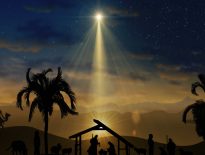If there is a crossroads where both the path of faith and the path of doubt or unbelief begin, it is prayer.
This statement is not a passing thought, but has often been the hypothesis and conclusion of the concern of various prestigious institutions and human thought, developed over thousands of years.
The question
Remarkably, Harvard University, through the Templeton Foundation, conducted a study on prayer that cost more than $3.5 million! The real question is not whether we get answers to our prayers, or whether prayer works, but the real question is something like this: Do we believe in God, or not? That is in fact the legitimate, real, and mature question. I have come to this conclusion as an echo of an idea in the writings of Pierre Teilhard de Chardin.[1]
In his writings, Teilhard provides a satisfactory answer to a question that has circulated since the dawn of human history and which will no doubt continue to trouble human minds throughout the ages. He concluded that the question: “Why do bad things happen to good people?” actually translates into a very different question, which is no longer concerned with finding out why these bad things have happened or are happening to good people, but puts us in the pragmatic situation of how we are going to react, what we are going to make of what has happened to us, and what we are going to do with it. Since I cannot undo what has already happened, and since I am at an essential crossroads in my life, the wisest thing to do is to say, as Emil Cioran did: “Let’s see what we can do.”
Returning to the subject of prayer, the great question is not what kind of answer I will receive to my prayer, but what I will do with this answer, which will sometimes be very different from my expectation. Above all, what will this answer, whether positive or negative, make of me? What will God look like in my conscience in the light of the answer to my prayer? In simple terms, what will my faith in God look like in the light of the answer I receive?
But what is faith in God and how does it manifest itself? Max Lucado[2] preemptively admonishes us: Faith in God, he says, is not faith that God will do what you want, but faith that God will do what is right. This is as hard to digest, and especially to accept, as it is real.
Just as you don’t realise the evil within you until you begin to fight it, likewise you don’t realise what your faith in God is until every other support or means of life is taken from you and the last hope of life is extinguished. What is left in such circumstances reflects the truth about our faith in God. On the stormy sea, the disciples forgot both their discipleship and Jesus as the Son of God. They even forgot God, whose name none of them had called upon. At that moment, the storm and death took over the whole framework of their lives, but Jesus did not ask about the sea or death, but looked them in the eye and said: “Where is your faith?” (Luke 8:25) When a prayer or a cry or a heart-wrenching longing is raised to God from the depths of our being, and when we hear nothing but the echo of our own cry, the great question that hangs in the atmosphere in which we live and move is not what answer we have received to your prayer, but where is our faith.
Certainty
This article does not have the space to cover the full range of views on prayer, which spans the entire spectrum between the useless and the divine. Beyond the various definitions, prayer remains a mysterious, integral part of the human being. Its mechanics cannot be dismantled or even influenced by our ideas about prayer, regardless of where those ideas fall on the spectrum. But whatever anyone, from atheist to ascetic, may think or say, under certain conditions prayer inevitably steps in.
There is only talk of “heroes” who have achieved the “feat” of dying without saying a prayer. Even if this were an achievement, I would like to say, and I say this with absolute conviction, that their “achievement” has not been verified. On the contrary. There is a prophetic statement in the Bible: “Before me every knee will bow,” says the Lord (Isaiah 45:23, Romans 14:11). This “every knee” includes the knees of the devil. One cannot say that where every knee bows, including the devil’s, a rheumatic or osteoporotic knee is an exception. It would be irresponsible to say that. “Heaven and earth will pass away” (Matthew 24:35, Mark 13:31, Luke 21:33), but the Word of God, including this one about “every knee”, will not pass away. So there is no point in worrying about or trying to change something that “does not change like shifting shadows” (James 1:17), such as “God’s invisible qualities—His eternal power and divine nature” (Romans 1:20).
However, it is wise and prudent to look at what is within our control, the variables we face at the crossroads: Now that what has happened has happened, what should I do? What will all this make of me?
Revelation
Shortly after landing at Melbourne airport on the west coast of Australia, two friends drove me back to the airport and put me on another flight, this time to the east coast. I was to pray for and anoint with oil in the name of the Lord a little girl who had a serious form of breast cancer. Her parents, missionaries in Kenya, were deeply distressed at their daughter’s suffering. It would be hard to imagine them not wondering about the connection between their lives of prayer and proclamation of God’s name among the Kenyans and the cruel and untimely suffering of their daughter.
One would naturally expect to see doubt in the air, emanating from their words and gestures, but in the midst of such suffering, their attitude was so different from many others I have seen! Even as their daughter suffered, they continued to be ambassadors for Christ, just as devoted and loving as when they served and taught people about God’s love under the open skies or in the earthen homes of rural Kenya.
They could so easily have slipped down the slippery slope of discouragement or rebellion, of doubt or unbelief! This was a result of a life dedicated to mission and the proclamation of the Gospel: “For what is our lot from God above, our heritage from the Almighty on high?” (Job 31:2)
There was no shadow play of cancer or dance of the death of the beloved child on the mother’s face, but the play of light, colour, and the smile of great trust in God. I realised that I had not been sent there to help so much as to be helped.
Her beautiful daughter, with the knife of death in her chest, was playing quietly with other children her age. It was hard to tell which of the group was the sick child. I witnessed a fascinating transfer of faith. Surely the communication between parent and child goes beyond the umbilical cord. I too was instantly absorbed into their world and realised that what I had been sent to do and had come there for was not what I had imagined.
After introductions and a brief exchange of words, I let the prayer of faith flow quietly as the drop of oil ran down the little girl’s forehead. I spoke with care and wonder. It was as if I was afraid to disturb the music of God’s loving waters. What I was praying for was like Peter’s hut in the white light on the Mount of Transfiguration.
I experienced then what I already knew, that the answer to prayer is not what happens or doesn’t happen to you, but what you become as a result of what happens. The events of life come and go; what you become is what remains. It is not what happens to you that you carry with you through life, but what you are and what you become. These are the eternal values of existence to which we unfortunately pay so little attention. Our encounter with suffering and the threat of death led to what we call a happy ending—the next day one of the doctors who had initially refused to operate on the little girl called her back and performed the surgery.
Other cases have taken a different path from this one, and even more different from what we expected or what we would have done if we had the power and the means. But no matter where the journey of life and its experiences has taken us, or is about to take us, one thing remains the same: who we have become, or could become, by walking this path.
Some of those who have prayed fervently for the lives of loved ones who nevertheless continued to suffer or who have left this world, have looked with suspicion or doubt at the One from whom they had different expectations. This shadow of suspicion and doubt was and is legitimate, but it is certainly wrongly cast. It must not overlap with the image of the Lord, but with our understanding. How much of what is happening do we understand? How much data do we have? Are our expectations realistic, good or, dare I say it, “superior” to God’s plans? I dare to pray like this: “Lord, help me never to have the strength or the will to doubt You! Help me to limit all this to my thoughts and feelings and never to Your heart!”
Confrontation
When everything seems to be going against me, when I myself have become a danger to my life, when the very things I fear are happening to me (as in the book of Job), when all that I have built with God is crumbling before my eyes, what can I make of it? Can I still hope? This is hard to answer. Yet…
There are two options that open up before me: either I look at something or I look at Someone. But it’s not as simple as it seems, because whether I look at something or at Someone depends on the image I have of that something or Someone. Job is the man who saw with his own eyes the collapse of everything that was actually a symbol of God’s work in his life, built up with much prayer and faith. It is very important to note that his trust in God survived the dense tangle of misunderstandings. He had anchored himself in the Lord, Whom he had come to love and by Whom he believed he was loved. In this anchor there is a kind of power and a kind of life that do not seem to obey natural laws. One day, says de Chardin, when we have mastered the energy of the wind, the tides, the waves and gravity, we shall, through God, master the energies of love, and then, for the second time, mankind will discover fire. It is fair to say that it was in the midst of such a trial that Job discovered the fire of love for God and neighbour of which Jesus was to speak so much.
From the perspective of death and the grave, Job is sure that the Lord will miss him, that He will long for him: “You will call and I will answer You; You will long for the creature Your hands have made” (Job 14:15). His double anchor survives the storm: he is loved by God and this love generates love in him. Nothing comes between him and his God, neither when he is given nor when he is taken away, neither when his prayer is answered nor when it is not answered. God remains the same for him, and this is indeed the great message of the book considered to be the oldest in Scripture.
Jeremiah, on the other hand, was not only a witness to material or family destruction, but saw with his own eyes the destruction of God’s people, the temple and the entire Jewish religious system. His “Lamentations” is indeed a picture of a wellspring of grief that takes thousands and millions of forms in the lives of so many people, but remains faithful to the essence: regardless of the flow of time and events, God is and remains good and loving. Our faith is not anchored in temples, nor in the curtain inside the temple, but goes beyond the curtain, where Someone is serving!
The element of greatest confusion, however, is unimaginable. Against the background of fervent prayers and petitions, raised in dramatic situations with the confidence that God is the only answer, the incredible is revealed: the very God to whom people pray seems to be fighting against the one who trusts in Him! “The Lord is like an enemy; He has swallowed up Israel” (Lamentations 2:5), or “Even when I call out or cry for help, He shuts out my prayer” (Lamentations 3:8), or “You have covered Yourself with a cloud so that no prayer can get through” (Lamentations 3:44). Job is convinced that the very One to whom he prays has robbed him of his ten children. He is in a cloud of heavy confusion, wondering if the One who gave him life might also kill him: “If it is not He, then who is it?” (Job 9:24).
Wrapped in the cloud of suffering and pain, logic perceives God as indifferent, useless, cruel or even hostile and evil! Such thinking pours down on fallen people like a cascade of discouragement: If even God hates me and is my enemy, what kind of being must I be and what hope can I have? From here to a fatal decision there is only one step! But is this the truth about God?
Undoubtedly, subject to human thinking, such a picture is bleak, but is our thinking the surest means of knowing the truth? Has our thinking never surprised us with its conclusions so far from the truth? Had Job, Jeremiah, and the host of saints who also suffered remained on the level of human thinking and logic, they would have been shipwrecked in this sea of discouragement, but they did not stop there. Realising the limitations and “congenital defect” of human thought and science, they migrated to another world, the world of faith and spirituality. They subordinated the understanding, the interpretation, and even the feeling of faith to the love and power of God.
I see, as Job would say, that my body is falling apart day by day and the inevitable is before me, I feel the pains, months of pains, and I cannot deny them, I live every moment of this drama without denying its reality, but what I know is totally different from what I experience, because “I know that my redeemer lives, and that in the end He will stand on the earth”(Job 19:25). In other words, I see the smoking ruins of Jerusalem, I see the dead on every street corner, I see children torn to pieces and parents broken by grief, I see the young murdered and the old mocked, I see all this and yet faith in God’s goodness rises above all that I see and makes me hope, “and therefore I have hope” (Lamentations 3:21).
Conclusion
Remnants of spiritual darkness lead people to seek ways and means to change God: sacrifices (even human ones), promises, gifts, evils of one kind or another, even murders. This pagan attempt is doomed to failure because in Him there is no change and no need for change, as “they will perish, but You remain; they will all wear out like a garment. Like clothing You will change them and they will be discarded” (Psalm 102:26). It is not God who needs to be changed, but I, the human being with my thoughts and conclusions, born in sin and conceived in transgression; I need to be changed. This is where we slip and fall into the deepest error about prayer. We come to believe that prayer is a means of changing God and we base our conclusion on biblical examples: Did Abraham not bargain with God? Didn’t Moses change God’s mind about destroying the people of Israel?
Before I write more about this, which may be the subject of a future article, let me say that the “struggles” of Job, Abraham, Moses and Jeremiah with God did not end with God changing, but with them changing. Prayer does not change God, but it does change the praying person. It leads them to the source of faith and makes them see the One who is invisible.




















